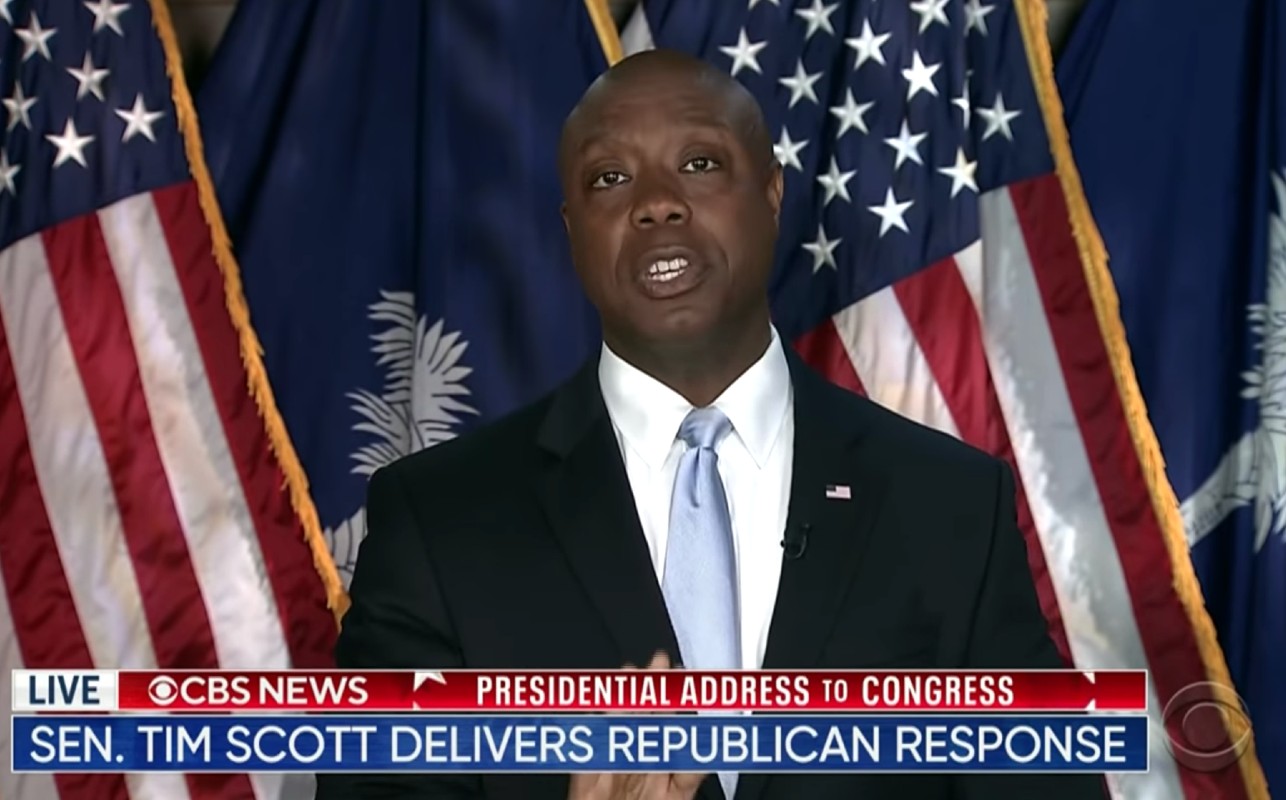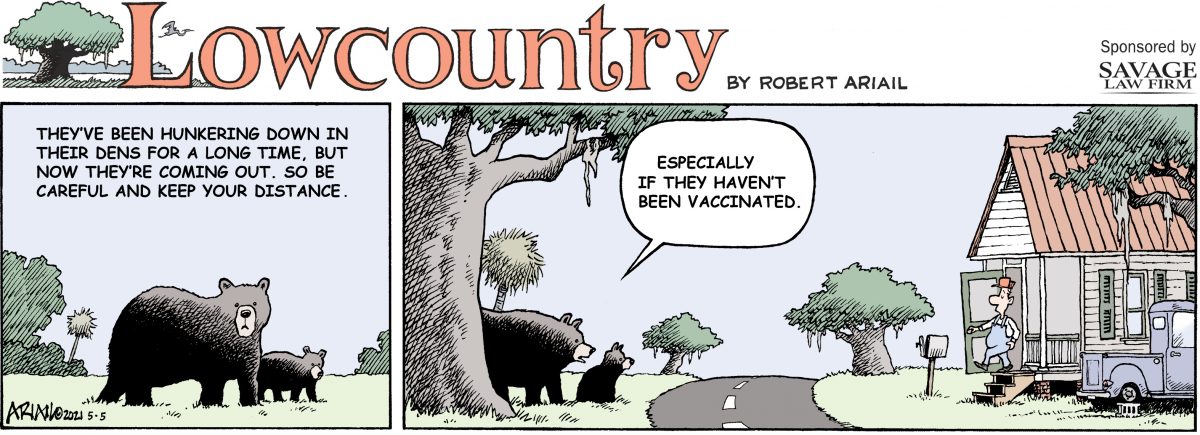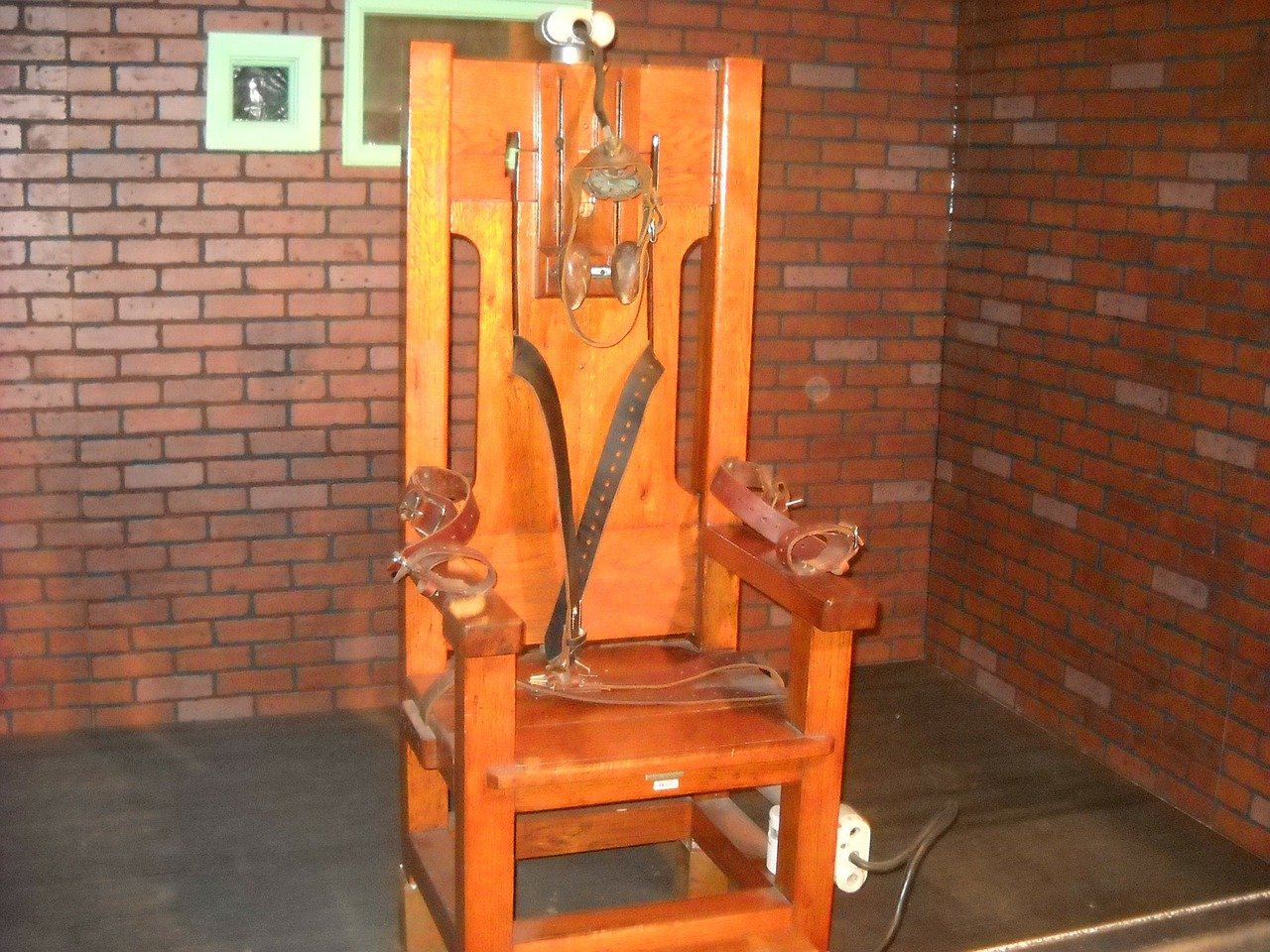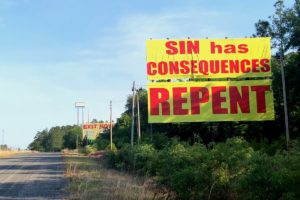STATEHOUSE REPORT | ISSUE 20.19 | MAY 7, 2021
BIG STORY: Scott draws two Democratic challengers
NEWS BRIEFS: One week to go in regular legislative session
LOWCOUNTRY, Ariail: Social distance
COMMENTARY, Brack: Reconsider South Carolina’s death penalty
SPOTLIGHT: Riley Institute at Furman University
FEEDBACK: Send us your thoughts
MYSTERY PHOTO: Some maritime thing
Scott draws two Democratic challengers

Staff reports | U.S. Sen. Tim Scott, R-S.C., now has two Democrats running to snare his seat in 2022 — second-term state Rep. Krystle Matthews and Spartanburg County Democratic Party chair Angela Geter.
Matthews, a Ladson Democrat who announced her bid last month, told the Charleston City Paper in a Q&A interview this week that she viewed Scott as an opportunist who didn’t represent the interests of South Carolina’s Black community.

When asked for her thoughts on Scott’s recent national response to President Biden’s address to Congress, she said, “His response was just horribly staining. It’s wildly ironic that while delivering an extremely contrasting speech of his own, he would call the president divisive. But, this is typical behavior of what we’ve seen, and so people are tired of it.
She added that she took issue with Scott’s claim the United States wasn’t a racist country.
“Do you know how many white people have inboxed me in the last 24 hours saying, ‘I’m white, and I know America is racist.’ And the god-awful pandering of the line, ‘cotton field to Congress,’ I mean … Because Black people are not smart enough to know that he’s pandering, right? We’re smarter than that.”
Geter to focus on three main issues

Meanwhile, Geter said she would focus on economic development, infrastructure and education during a May 6 announcement, according to the Spartanburg Herald-Journal.
“I’m young enough for today’s issues. I’m old enough to distinguish between fact and fiction,” she said. “And humble enough to know when I am uncertain about that distinction and take steps to make it clear. … I believe in federalism. I do not see the federal government as a problem. Instead it is essential to ensure we all share in the promise in public goods produced by democracy.”
- Have a comment? Send to: feedback@statehousereport.com.
One week to go in regular legislative session

Staff reports | With just three legislative days left in this year’s regular session of the General Assembly, the fate of two much-discussed bills remains unclear.
Senators have moved forward with measures to make hate crimes illegal and to reform Santee Cooper without selling the utility, but whether compromises with House versions of bills will be finished is up in the air, according to legislative insiders.
That won’t be the case with measures to allow gun owners to carry pistols in the open, as long as there are permits, or with authorization of firing squads as a choice for state executions. Both versions of the House and Senate measures are close enough that compromise is expected in the week ahead. Gov. Henry McMaster also is expected to sign both.
It looks like three other bills under consideration — family leave for state employees, election law reform and approval of use of marijuana to relieve suffering — may not be resolved by Thursday when the regular session ends.
In June, lawmakers will meet to finish the state’s $11 billion budget and consider any measures in conference committee.
In other recent news:
![]() Senate passes open carry gun measure. South Carolina senators on Thursday approved a bill 28-16 allowing people with concealed weapons permits to carry their guns in the open so long as they have required training and permit. The bill now goes back to the S.C. House. More: Associated Press | SC Public Radio.
Senate passes open carry gun measure. South Carolina senators on Thursday approved a bill 28-16 allowing people with concealed weapons permits to carry their guns in the open so long as they have required training and permit. The bill now goes back to the S.C. House. More: Associated Press | SC Public Radio.
S.C. House OKs firing squads for executions. The last state-held execution was 10 years ago today. Executions were halted due to a lack of lethal injection drugs. While inmates could still choose the electric chair in the state, none opted to do so in that time period. Now after the House on Wednesday approved a bill to require inmates to choose between the electric chair or firing squad, the General Assembly is poised to send a bill soon to the governor, who is expected to sign it. More: AP News | The Post and Courier.
Hate crimes proposal survives Senate committee challenge. Some Republican senators questioned the necessity of a hate crimes bill for South Carolina during a Senate committee hearing yesterday, but the bill passed 13-10 to head to the Senate floor. South Carolina remains one of just two states without a hate crimes law. More: AP News | WTGS.
New state agencies extend reach of government in S.C. Under Gov. Henry McMaster’s leadership, there has been the creation of three stand-alone agencies: departments of Veterans’ Affairs and Children’s Advocacy, and the Office of Resilience. The new agencies have a combined budget of $173 million. More: The Nerve.
State lawmakers continue to review DJJ. South Carolina lawmakers said they will continue to look into concerns highlighted by a Legislative Audit Council review of the state Department of Juvenile Justice. The report, released last month, claims staffing shortages at the state agency have led to an increase in violent incidents. More: WSPA.
McMaster signs bill allowing S.C. athletes to profit from likeness. South Carolina college athletes will soon be able to profit from their own brands, joining more than 20 states with similar measures. More: The Post and Courier.
S.C. not on track to meet Biden vaccination goal, DHEC says. South Carolina health officials said Wednesday the state is not on track to achieve the Biden administration’s goal of 70 percent of the population being vaccinated with one of three coronavirus vaccines by July 1. More: WBTW.
Social distance

Here’s a new cartoon by Robert Ariail that first was published in our sister newspaper, the Charleston City Paper. Love the cartoon? Hate it? What do you think: feedback@statehousereport.com.
Reconsider South Carolina’s death penalty

By Andy Brack, editor and publisher | South Carolina, one of 24 states that continues to allow executions, hasn’t been able to carry one out for the last decade because it hasn’t had access to lethal injection drugs. Those on death row currently pick whether they want to die by electrocution or lethal injection. Predictably with the drugs not available, that is the preferred choice, which has ground executions to a halt.
 But now the S.C. House, following in the footsteps of the state Senate, approved a measure that would add death-by-firing-squad to the list of choices. With this as a replacement choice if lethal injection drugs are not available, executions could continue. Gov. Henry McMaster has pledged to sign the bill into law.
But now the S.C. House, following in the footsteps of the state Senate, approved a measure that would add death-by-firing-squad to the list of choices. With this as a replacement choice if lethal injection drugs are not available, executions could continue. Gov. Henry McMaster has pledged to sign the bill into law.
All of this is procedural. There hasn’t been serious consideration about whether it’s right for the state to execute prisoners on South Carolina’s death row, which now has 37 inmates.
So consider the thoughts of Hunter Limbaugh, elected in 1994 as a Republican to a Florence seat in the S.C. House. After that election, the GOP took over the House after years of rule by Democrats.
Limbaugh, now a lobbyist, today would describe himself in 1994 as “a very conservative traditional Republican.” He said in an interview he probably wouldn’t have given a second thought to voting for the firing squad bill had it been before the chamber because he was for the death penalty.

“It wouldn’t be a stretch that I might very well have been a cosponsor of the bill,” he said.
But not now, in part he says, because he has understood how his children have less certitude about right and wrong. In other words, millennials see a lot more gray than black or white.
Then there’s another difference: Limbaugh, who left the House in 1997 to become the chief legal counsel for Gov. David Beasley, served as the governor’s representative “to make the call on reprieves at the time of an execution,” he said, adding he was in charge of giving final approval before an execution took place.
“I’d then stay on the phone until the death was declared. It was some very intense, up-close and personal stuff.”
At one point, he decided to wait because the U.S. Supreme Court had not ruled on a petition for a stay of execution.
“I literally had the life of this person in my hands. Honestly, it felt horrible. My answer was to wait, and the stay was soon denied, but those are five minutes I’ll remember for the rest of my life.”
In other words, Limbaugh faced something more instant than a vote on procedure as considered this week in the S.C. House. He felt the death penalty in action.
Over the last generation, DNA evidence, often now used to exonerate wrongly convicted people on death row, has clearly shown how the justice system is tilted against people of color and those without good legal counsel. “Claims that each execution deters a certain number of murders have been thoroughly discredited by social science research,” adds the ACLU.
Limbaugh said his experience with the death penalty has led him to conclude it is wrong to put people to death.
“I just personally have come to the conclusion that neither I nor the state acting on the right to take the life of another human being should do so.” But he’s not opposed to tough punishment: “It has all the right in the world to isolate people who have demonstrated an inability to live in civil society.”
It’s time to rethink the death penalty in South Carolina, not just add another option on the menu.
- Have a comment? Send to: feedback@statehousereport.com.
Riley Institute at Furman University
 The public spiritedness of our underwriters allows us to bring Statehouse Report to you at no cost. This week’s spotlighted underwriter is Furman University’s Riley Institute, which broadens student and community perspectives about issues critical to South Carolina’s progress. It builds and engages present and future leaders, creates and shares data-\supported information about the state’s core challenges, and links the leadership body to sustainable solutions.
The public spiritedness of our underwriters allows us to bring Statehouse Report to you at no cost. This week’s spotlighted underwriter is Furman University’s Riley Institute, which broadens student and community perspectives about issues critical to South Carolina’s progress. It builds and engages present and future leaders, creates and shares data-\supported information about the state’s core challenges, and links the leadership body to sustainable solutions.
Launched in 1999, the Institute is named for former South Carolina Governor and former United States Secretary of Education Richard W. (Dick) Riley. It is committed to nonpartisanship in all it does and to a rhetoric-free, facts-based approach to change.
- Learn more about the Riley Institute.
- Also learn more about the Riley Institute’s Center for Education Policy and Leadership.
Send us your thoughts
We love hearing from our readers and encourage you to share your opinions. But to be published, you’ve got to provide us with contact information so we can verify your letters. Letters to the editor are published weekly. We reserve the right to edit for length and clarity. Comments are limited to 250 words or less. Please include your name and contact information.
- Send your letters or comments to: feedback@statehousereport.com
Some maritime thing

Here’s something with maritime connections, but what is it? Send your guess to feedback@statehousereport.com — and remember to include your name, home city and contact information.
 Last week’s mystery, “Sin,” drew more correct responses that we thought because we figured it was a tough photo. It showed a billboard off the westbound lane of Interstate 26 near Exit 136 (S.C. Highway 6), which leads to North and Swansea.
Last week’s mystery, “Sin,” drew more correct responses that we thought because we figured it was a tough photo. It showed a billboard off the westbound lane of Interstate 26 near Exit 136 (S.C. Highway 6), which leads to North and Swansea.
Only George Graf of Palmyra, Va., and Elizabeth Jones of Columbia correctly identified the location. But kudos to Allan Peel of San Antonio, Texas, for figuring out the photo was either at Exit 136 or along Interstate 95 (he bet all of his marbles on Interstate 95!)
- Send us a mystery. If you have a photo that you believe will stump readers, send it along (but make sure to tell us what it is because it may stump us too!) Send to: feedback@statehousereport.com and mark it as a photo submission. Thanks.
ORDER NOW: Copies are in Lowcountry-area bookstores now, but if you can’t swing by, you can order a copy online today.
ABOUT STATEHOUSE REPORT
Statehouse Report, founded in 2001 as a weekly legislative forecast that informs readers about what is going to happen in South Carolina politics and policy, is provided to you at no charge every Friday.
Meet our team
- Editor and publisher: Andy Brack, 843.670.3996
- Special correspondent: Lindsay Street
Donate today
We’re proud to offer Statehouse Report for free. For more than a dozen years, we’ve been the go-to place for insightful independent policy and political news and views in the Palmetto State. And we love it as much as you do.
But now, we can use your help. If you’ve been thinking of contributing to Statehouse Report over the years, now would be a great time to contribute as we deal with the crisis. In advance, thank you.
Buy the book
Now you can get a copy of editor and publisher Andy Brack’s We Can Do Better, South Carolina! ($14.99) as a paperback or as a Kindle book ($7.99). . The book of essays offers incisive commentaries by editor and publisher Andy Brack on the American South, the common good, vexing problems for the Palmetto State and interesting South Carolina leaders.
More
- Mailing address: Send inquiries by mail to: P.O. Box 21942, Charleston, SC 29413
- Subscriptions are free: Click to subscribe.
- We hope you’ll keep receiving the great news and information from Statehouse Report, but if you need to unsubscribe, go to the bottom of the weekly email issue and follow the instructions.
- Read our sister publications: Charleston City Paper (every Wednesday) | Charleston Currents (every Monday).
- © 2021, Statehouse Report, a publication of City Paper Publishing, LLC. All rights reserved.

















 We Can Do Better, South Carolina!
We Can Do Better, South Carolina!